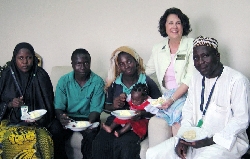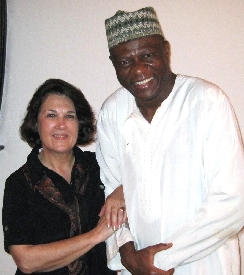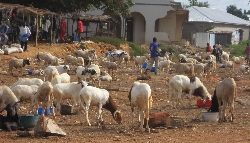A Fulbright Footprint
February 22, 2011

Meloy and guests at her birthday party, which she celebrated during her time at Kwara State University in Nigeria last fall. She traveled to Africa via a Fulbright Specialist Program appointment, and in March, she returns to Nigeria and Kwara State University to continue her special education teacher-training work at the university, a brand new institution helmed by a former WIU administrator.
[Download Print-Quality Image]
Linda Loxley Meloy, a Beardstown (IL) native and a Western Illinois University alumna who has been a faculty member at her alma mater for 22 years, recently traveled to Nigeria via a Fulbright Specialist Program appointment. She returns to Africa in March to continue her special education teacher-training work at Kwara State University, a brand new university helmed by a former WIU administrator.
MACOMB/MOLINE, IL -- "Lasting impact" is one of the tenets listed on the Fulbright Specialist Program's website. For Linda Meloy—professor in WIU's special education graduate program in the curriculum and instruction department, school psychologist, WIU alumna and appointed Fulbright Specialist—her goal is, indeed, to have such an impact for Kwara State University, a brand new institution located outside of Ilorin, Nigeria. Thanks to the Fulbright Specialist Program, her relationships with her former and current Western and education-field colleagues and her commitment to educating children, Meloy's "footprint" at Kwara State will be the foundation on which its faculty and staff build its curricula and pedagogy for undergraduate and graduate training programs for teachers of students with high-incidence disabilities.
Last fall, as an appointed Fulbright Specialist, Meloy traveled to Kwara State to advise the institution's general and special education faculty members as they develop programs for teachers of students with learning disabilities, attention-deficit hyperactivity disorder (ADHD) and emotional and/or behavioral disorders. In early March, Meloy will travel back to Nigeria for an 18-day stint, during which she will continue her work with educators, as well as her knowledge-sharing quest, which according to its website, is part of what the FSP is designed for: "to engage [U.S. academics and professionals and their counterparts] in short-term collaborative two- to six-week projects at higher education institutions in over 100 countries worldwide."
Laying the Groundwork
Meloy's Nigerian journey began at Western Illinois University and in her 30-plus year career in special and elementary education. Through a professional relationship with Dr. Abdul-Rasheed Na'Allah, former chair of Western's African American studies department—who is now the vice-chancellor (equivalent to the office of university president) of Kwara State University—and a Fulbright Specialist Program (FSP) appointment she was awarded in 2010, she made the more than 6,000-mile trip in mid-October and stayed through approximately mid-November.
"This new university is being funded by the federal government and by Kwara State, which is one of the 36 states in Nigeria. Kwara State University has a brand new facility that is expanding rapidly, and Dr. Na'Allah is bringing in people from all over the world to teach there, either for long-term commitments or short-term ones. While I was there, I met people from Norway, Italy, the U.S., Canada, Latvia and different places in Africa, as well as a lot of Nigerians who had either been in Canada or the U.S., who are coming back to teach at this university," Meloy explained.
During her time there in March, Meloy will continue her work in advising and training the new university's faculty and staff, specifically the instructors who will be teaching students who are studying to be special education teachers.
"Because Nigeria used to be part of the British Empire, its education system reflects the British model. They have nurseries and preschools—a lot of children there begin schooling at the age of two. Then they have a primary school, which is for students who are kindergarten-aged through fifth or sixth grade. After that, students attend secondary school, which is about seventh through 12th grades. What is different, though, about all of Nigeria, is that they have differential levels of training for teachers. So to be a nursery school or preschool teacher, they only require a two-year degree for that level. Because 85 percent of brain development is complete in a child by age five, this is the most critical time period to have children instructed by highly qualified teachers," she said.
Meloy added that for primary-school teachers in Nigeria teachers are required to have a three-year degree, and for secondary teachers a four-year degree is required. She noted that one of her biggest hopes—and what she has dedicated much of her FSP work toward so far at Kwara State University—is that all of Nigeria will be moving toward making the degree requirements the same for all teacher levels.
"I don't know how long that's going to take, though," she said. "They also haven't yet embraced an inclusive model, in which kids with all kinds of disabilities are attending school near their homes and are educated there. This is going to take a tremendous amount of education and funding, as well as an inclusive mindset to accomplish. It is also going to require the parents' cooperation. And Nigeria is not unlike some other areas of the world, where parents are, many times, ashamed of their children's disabilities. So inclusion is in its fetal development, or at least in its infancy, and so is de-institutionalization."
To help facilitate some of the goals of her training program, Meloy—who was interviewed on Nigerian television, met with many Nigerian teachers and other university faculty individually and the commissioner of education in Kwara, as well as addressed a crowd of nearly 500 education professionals while she was there last fall—will meet with officials from Nigeria's Federal Ministry of Education in March.
"When I return, I will also be traveling to two international schools, where I will give daylong presentations about learning disabilities and behavior disorders," Meloy said. "In addition, I'll be doing a national conference in Abuja, Nigeria's capital city, about the education needs for children with high-incidence disabilities."
Part of Meloy's preparation for her second trip to Nigeria includes her effort to collect books for school children, as well as materials for Kwara State University's faculty. Currently, she is collecting resources for a school near the university, and she also mentioned she has sent multiple research articles to faculty members, as many of them do not have access to resources like ERIC or other educational-resource databases.
"When I was there last fall, I left a number of recommendations, and one was that, basically, they are not really ready to offer this program. At this point, they can't train teachers to work with children with learning disabilities and behavior disorders if there are no jobs for them. And there are not going to be any jobs until the school system evolves to a point at which they recognize they have students with these disabilities," she said. "I told them, 'Right now, Kwara State University has to work on raising awareness with parents and educators through an awareness campaign.' They also need to establish a child-development clinic, so they can accurately identify the children with high-incidence disabilities. They are currently working on funding for that."
Meloy noted that Dr. Na'Allah has already applied to have her come again on a separate FSP appointment. It is a possibility, as according to the FSP site, "U.S. faculty and professionals apply to join a Roster of Specialists for a five-year term. Roster candidates are reviewed by peers in the same discipline, and by the J. William Fulbright Foreign Scholarship Board."
Meloy said she is taking a wait-and-see approach before she plans for that, however. She said she told him that, largely, will depend on the outcome of her trip in March. But, she did note that, so far, she feels her work is indeed having a profound impact.
"So far, everything I have recommended, they are doing. It makes me very proud, and frankly, it is a bit awe-inspiring. They are moving forward with my recommendations and a long-range plan," she said.
For Meloy, her FSP work is a rewarding way to finish out her 30-year career in special education; she plans to retire from WIU in 2012.
"You know, when I was a non-traditional student, back in the late 1960s and early 1970s and trekking back and forth to WIU in Macomb from Beardstown where I lived with my husband and child, I never thought I would grow up to be Fulbright Scholar," she said. "I think it is one of the best ways I can wind up my long, rewarding experience in my field and at Western, which is where it all began."
Read more about Meloy's Fulbright Specialist Program work via her "Notes from Nigeria" blog at http://meloyinnigeria.blogspot.com/. For more information about the Fulbright Specialist Program, visit the program's website at www.cies.org/specialists/. For more information about Meloy's work, contact Tami Seitz, director of marketing at WIU-QC, at (309) 762-9481 or via email at TS-Seitz@wiu.edu.
Posted By: Teresa Koltzenburg (WIUNews@wiu.edu)
Office of University Communications & Marketing



Connect with us: